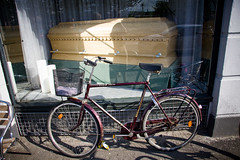

There was a recent, symbolic raid on bicycles last week where the police went after our cycling citizens for fun and profit.There was coverage on every news channel about the police handing out fines and in every broadcast and in every newspaper article one number was mentioned. 20,000 cyclists are admitted to hospital every year in Denmark. It had absolutely no context for the bike raid, but it was repeated again and again.
I was thinking about the affect heuristic in relation to how we should be promoting cycling. Wikipedia has a page about the affect heuristic but Eliezer Yudkowsky has a great article about it on the excellent Less Wrong blog - a ‘community blog devoted to refining the art of human rationality’.
As Yudkowsky puts it, “The affect heuristic is when subjective impressions of goodness/badness act as a heuristic - a source of fast, perceptual judgments. Pleasant and unpleasant feelings are central to human reasoning…” A paper I’m looking forward to getting my fingers on is The affect heuristic in judgments of risks and benefits. Journal of Behavioral Decision Making by Finucane, M. L., Alhakami, A., Slovic, P., Johnson, S. M. (2000)
The affect heuristic is in play more than ever in modern society, thanks to the regrettable development of The Culture of Fear. Not least here in Denmark.
The “20,000 cyclists admitted to hospital” isn’t a number that a dozen journalists googled by coincedence. It’s a number sent out in a press release so that journalists don’t have to think for themselves. Not surprisingly, it’s the Danish Road ‘Safety’ Council who controls the distribution of such statistics. They really should open a car dealership on the side.Stats like that one have incredibly negative effects on risk perception. Over the past two years, the flow of negative stats has increased. The main problem is that if you have a leak of negativity, you should also have a plug. We need a plug here in Denmark. We need a counterweight to the car-centric flow of information. We need people to fight for cycling, because we’re killing it off. That’s what bicycle advocacy is all about.
Looking around the world at colleagues I’ve met there are many who work hard at plugging. Fietsersbond, the CTC in the UK and FUBICY in France spring to mind. Countering the negative press and destructive stats that filter out of other organisations. Cyclists up in the UK! Um, yes… but cycling is up so actually the number of accidents is down. Safety in numbers principle. Duh…
If you keep repeating something like “20,000 cyclists end up in the hospital every year”, it starts to sink in that cycling is ‘dangerous’. This is the affect heuristic at play in all the wrong ways.In the press we never hear details about these emergency room visits. Many, if not most, are minor injuries to arms and legs. We don’t hear whether or not most cyclists walk out of the emergency ward and ride home, which is quite likely. I recall a stat from Norway about how 90% of cyclists who visited a hospital were on their bike again within the week. An important detail to include, don’t you think? Provides a rational balance to the shockhorror angle.I was at the hospital last week, actually. Just for some tests. Got talking to the doctor who told me that she commutes by train from Odense - an hour and a half away from Copenhagen. I asked, innocently enough, if she had a bike parked at the Nørreport train station - which is a 10 minute ride from the national hospital.No, no… she ‘didn’t dare cycle in Copenhagen’. I assured her that we live in one of the world’s two safest countries to cycle in. She was interested to hear that but she’s been affected - affect heuristic again - by the negative press cycling has had over the past two years.
The City’s Bicycle Office knows that scaring people off of bikes doesn’t do anyone any good. In an interview with a Toronto newspaper, Andreas Rohl, project manager for Copenhagen’s cycling infrastructure, said “We try to never talk to the public about cycling safety. […] We just feel if we start to talk publicly about safety, people will start to doubt if cycling is safe…”

This is apparently how the Road Safety Council ‘sells cycling’ in Denmark
Let’s look at numbers. Danes cycle 30% less than they did in 1990. According to the brilliant research by Prof. Lars Bo Andersen at the University of Southern Denmark, if will still cycled those 30% we could save 1500 lives a year through the health benefits of cycling. We both spoke at a conference last year, actually, and I asked him about it. He said that the 1500 number is low. Way too low. I’m looking forward to seeing what number he comes up with.
Shouldn’t this positive news about the health benefits of urban cycling be repeated constantly? Shouldn’t stats like this be one of the plugs to stem the flow of car-centric information?Let’s look at the 20,000 number with layman’s eyes.According to the national statistics, 18% of Danes cycle each day.
There are 5,540,241 people in Denmark, according to the latest numbers from last month.
That means there are 997,243 people commuting to work or school each day. Let’s be realistic but, at the same time, conservative. Let’s make that number 1.3 million to include short trips by bike that never get counted in commuting stats. It’s probably much higher.So… 1,300,000 people use a bicycle each day.20,000 are admitted to hospital for minor or major injuries.That means that only 1.5% - probably lower - of our daily cyclists are unlucky enough to need medical assistance.On the other hand, those 1.3 million people ride every day.1.3 million people times 365 days = 47,450,00020,000 hospital admittances is 0.042%.Goodness… that looks good.Which headline is most positive and likely to encourage people to cycle? 20,000 cyclists hospitalised each year!or
Only 1.5% [or 0.042% if you like] of cyclists hospitalised each year! Most of them for minor injuries!
Traffic deaths are always tragic. No doubt about it. In Denmark every around 45-50 cyclists are killed in traffic accidents. Like everywhere else, the majority die in accidents with cars. Which is why we shouldn’t ignore the bull.
Let’s say 50 cyclists lose their lives each year.Out of the same 1.3 million Danes.That’s 0.00384%.Let’s balance that with the fact that, according to the comprehensive research by Prof. Lars Bo Andersen, cyclists live seven years longer, are less ill whilst alive and enjoy a higher quality of life.And I recall reading that BECAUSE we cycle so much we save 600 lives a year! That’s AMAZING news! Where are the headlines?“Cycling is safe!““Safety in numbers… get on your bike and make cycling safer!““600 lives saved every year by cycling!““Save your life! Ride a bike!“Etcetera. Ad libitum.There is much talk of risk per kilometre [or mile] travelled. This is probably the most car-centric twist on traffic statistics in history. I heard a year or so ago that this way to angle the stats was an invention of the car industry, but I’ve never been able to find out where it originated or when it was first brought into use. Which all makes it feel a bit like the mystery surrounding the invention of Cap-and-Trade C02 trading schemes by Enron and Goldman Sachs and Al Gore.If risk per kilometre was worth anything, space travel would be the safest form of travel. However, after a quick google, I learned that 32 astro/cosmonauts have lost their lives, out of 517 people who have travelled in space. Not great odds. I’ll stick to my bicycle. It takes me to the moon and back every day.The whole point is that those of us who wish to promote cycling should focus most intensely on countering the attempts by others to brand cycling as dangerous. Including those who provide negative affect heuristic statistics.It’s promoting cycling, it’s basic marketing.
We’re not doing it good enough. It’s madness.




